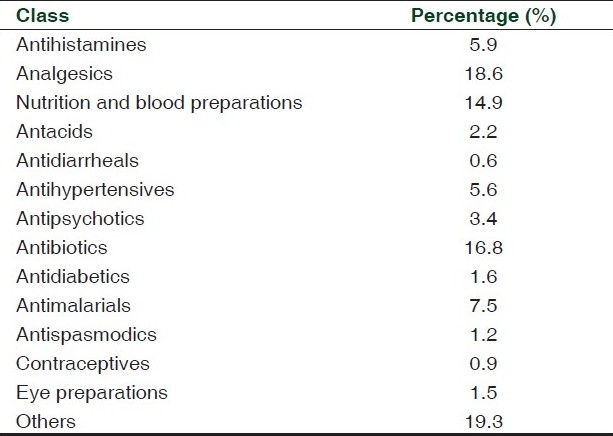Sir,
Consumption of medicines has increased over the years due to an increase in the availability of treatment for most diseases and the growing public interest in health and health products.[1] Medications in households lead to medication wastage which has an economic impact. Globally, unused medications cost billions of dollars. Some reasons identified as causes of unused medication are over prescribing, change in treatment plan, adverse drug event, medication reaching expiry dates, and non-adherence to therapy.[2] In Nigeria, medicine financing is mainly out-of-pocket, with a few individuals benefiting from insurance coverage.[3] This implies that most burdens of economic loss due to unused/expired medications lie on household members. Unused medication in households has not been studied in Nigeria. This research is aimed at determining the common classes of unused medications in households and medication disposal practices.
The study was conducted from November 2010 through February 2011 in Jos North Local Government area, Plateau state, Nigeria. Six hundred and fifty two households were recruited by stratifying the local government area into different political wards and household from each stratum were selected through a systematic, random sampling technique. Respondents from each household were interviewed using a pre-tested questionnaire which addresses the issues of demography, unused medicines in homes and medicine disposal practices. Informed consents were obtained from the participants before the interview. We considered left over medicines as unused medications in this study. Their names, strength, dosage form, expiry date, and quantity were recorded.
Data obtained were entered into Statistical Package for Social Sciences (SPSS) to generate descriptive statistics which were represented in percentages. A total of 427 households participated in the study, which represents 65.5% of the recruited households. The mean family size and age (years) of interviewee were 5.8 and 36.4, respectively. About 58% of household heads had secondary education and only 3.5% of households had insurance coverage. The results showed that 94.1% of households had unused medicines. Two thousand nine hundred and four unused medicine items were found in households representing a mean of 6.8 items per household. A total of 41.7% and 58.3% of the unused medicines were obtained on prescription and self-medication, respectively. The community pharmacies (52.1%) and patent medicine vendors (33.3%) were the common sources of these medicines. About 0.7% of the medicines found in households were expired and 15.6% were unlabeled. The common types of medicines kept in households were analgesics (18.6%), antibiotics (16.8%), and nutrition/blood preparations (14.9%) [Table 1]. All respondents of households reported that they dispose their medicines in the dustbin/trash can.
Table 1.
Classes of medicines found in households

The mean number of unused medications found in households is unsurprising because in Nigeria, self-medication is common. Most people keep unused medications at home either for re-use or to give it to someone else who has similar problem with them. Furthermore, these medications may be a result of non-adherence to therapy. The most common classes of medicines found in households were analgesics, antibiotics, and nutrition/blood preparations. In Nigeria, analgesics are the most commonly procured medicines and self-medication with them is high. They are usually the first line of medicines used by community members in an event of illness. This is because most illnesses present with pain and fever, and households keep analgesics for use in an event of illness. The high amount of antibiotics found in households is an indication of inappropriate use of antibiotics and can lead to resistance which is a major challenge in the treatment of infectious diseases in developing countries. Nutrition/blood preparations are common in households because people take them as supplements for promoting health, preventing illness, boosting the immune system, prevention of stress, and to supplement regular nutrition.[4] Hence, their use is usually seen as part of a healthy lifestyle. In Nigeria, medicines are commonly dispensed without appropriate labeling. Most dispensing envelopes do not contain names and expiry dates of dispensed medicine. Household members only identify these medicines with certain symptoms and diseases. This can lead to the administration of wrong medicines for a disease condition. This calls for appropriate labeling of medicines during dispensing.
Basic education on appropriate disposal of medicines is lacking in Nigeria. Unused/expired medications are not returned to pharmacies for appropriate disposal as obtainable in developed countries. The accumulations of pharmaceuticals in the soil, ground water, and drinking water have been reported.[5] However, no such studies have been done in Nigeria, but it is likely that these compounds are accumulating in the environment, since they are mostly disposed in refuse dump. Hence, there is a need for public education on appropriate disposal of medicines. In addition, government should encourage reverse distribution network in which community members are encouraged to return unwanted medications to pharmacies which then arrange for approved agents/bodies to collect and destroy them.
REFERENCES
- 1.De-Bolle L, Muhuys E, Andriaens E, Remon J, Bortel LV, Christiaens T. Home medication cabinets and self-medication: A source of potential health threats? Ann Pharmacother. 2008;42:572–9. doi: 10.1345/aph.1K533. [DOI] [PubMed] [Google Scholar]
- 2.James TH, Helms ML, Braund R. Analysis of medicines returned to community pharmacies. Ann Pharmacother. 2009;43:1631–5. doi: 10.1345/aph.1M209. [DOI] [PubMed] [Google Scholar]
- 3.Medicine prices in Nigeria: Prices people pay for medicines. Abuja: Federal Ministry of Health; 2006. Federal Ministry of Health. [Google Scholar]
- 4.Linden KA. Pharmacoepidemiological study of medicine use among finish conscripts. Annales Medicinae Militaris Fenni. 2005;2:6–113. [Google Scholar]
- 5.Tong AY, Peake BM, Braund R. Disposal practices for unused medications around the world. Environ Int. 2011;37:292–8. doi: 10.1016/j.envint.2010.10.002. [DOI] [PubMed] [Google Scholar]


